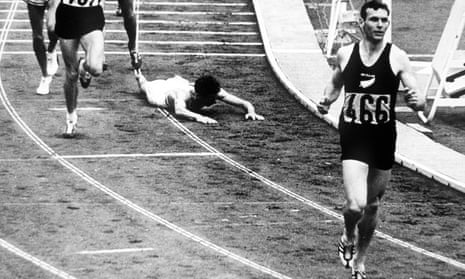The New Zealander Peter Snell, who has died of a heart attack aged 80, was a colossus in the world of athletics who won three Olympic gold medals in middle-distance running during the early 1960s.
Having won the 800 metres at the Rome Olympics of 1960 as an almost unknown 21-year-old, Snell went on to set a world mile record of 3min 54.4sec (on grass) in 1962, and then a world 800m record of 1:44.3 (also on turf). He arrived at the 1964 Tokyo Olympics as carrier of his nation’s flag at the opening ceremony, and was favourite to win the first Olympic 800m/1500m double by a man since Great Britain’s Albert Hill had achieved the feat in Antwerp 44 years earlier.
He realised that dream with two final runs of utter brilliance. Standing at 5ft 10in and weighing just under 13 stone, Snell traded on his power, strength and stamina rather than outright speed. In the 800m final, boxed in at 400m, he had to battle his way past the leaders to win by five metres before taking the 1500m with a superlative performance as he hit the front at 300m out, annihilating the world’s best to win by more than 10m.
Sebastian Coe, who later won Olympic medals at the same distances, credited Snell with changing the way athletes prepared for middle-distance running – both physically and mentally. “He would think nothing of a 20-mile training run,” said Coe. “He was unbelievably fit, with the physique of a rugby player. For four years he never lost in global competition, and he would still be a medal contender in Tokyo 2020 with the sort of times and runs he was producing in 1964.
“I tried twice to do the double in 1980 and 1984, and finished twice with a gold and a silver. So I know just how hard it is. It isn’t just the physicality, it’s the mental toughness that’s required. And you only had to be in his company to realise how hard it would have been to have beaten him.”
New Zealanders still recognise Snell as their greatest Olympian, and his golden double in the 800m and 1500m has not been replicated since. Yet his time at the top was short. In late 1964 he bettered his existing mile world record with a time of 3:54.1, but by the end of 1965, after a number of unexpected defeats and a season where that record fell to the Frenchman Michel Jazy, he announced his retirement at the age of 26. After a spell in public relations he moved into academia.
Snell was born in the small North Island town of Opunake to George, an electrical engineer, and his wife, Margaret. A good all-round sportsman first at Te Aroha College in Waikato and then at Mount Albert grammar school in Auckland, he played in the New Zealand junior tennis championships and won the Auckland junior half-mile in a time of 1:59.4 on virtually no proper training. Spotted by the renowned and ruthless coach Arthur Lydiard, young Peter was persuaded that the track was where his future lay. It was Lydiard who helped him develop an emphasis on strength training based on long runs, rather than on the shorter interval training that had been the norm for middle-distance runners up to that point. In the period from 1960 to 1964 this gave Snell a big edge over his rivals, who found his power and stamina too much to cope with. The world record 800m time he set in 1962 would have won him the 800m gold at the Beijing Olympics of 2008.
After retiring from athletics he worked in the tobacco industry for Rothmans in a public relations capacity but became increasingly uneasy about that role, and, around the break-up of his first marriage to Sally Turner, decided to seek out a new life as an academic. In 1973 he moved to the US, where he gained a science degree at the University of California and a PhD in exercise physiology at Washington State University before moving to Dallas, Texas, in 1981. There he became director of the Human Performance Center at the University of Texas Southwestern Medical Center, concentrating mostly on sports fitness and becoming one of the most respected experts in his field.
He did not leave the university until the age of 75, and his competitive spirit never waned. In 2003 he became the US over-65s orienteering champion and in 2017, despite a heart condition first diagnosed in 2010, he competed in table-tennis events at the World Masters Games in Auckland at 78, winning a silver medal in a team event as well as competing in the singles and in the mixed doubles with his second wife, Miki (nee Hervey), a Texan whom he had met at a running club dinner and whom he married in 1983.
In 2017 Snell donated his Olympic medals and the two golds he won at the Commonwealth Games in Australia in 1962 to the Museum of New Zealand Te Papa Tongarewa in Wellington. In November this year he was honoured at a dinner in Monaco that was attended by luminaries of the athletics world. However, he was unable to be there due to illness.
Snell was knighted in 2007, and a statue of him was erected of him at Whanganui, where he broke the world mile record in 1962.
He is survived by Miki and by two daughters from his first marriage, Amanda and Jacqui.

Comments (…)
Sign in or create your Guardian account to join the discussion